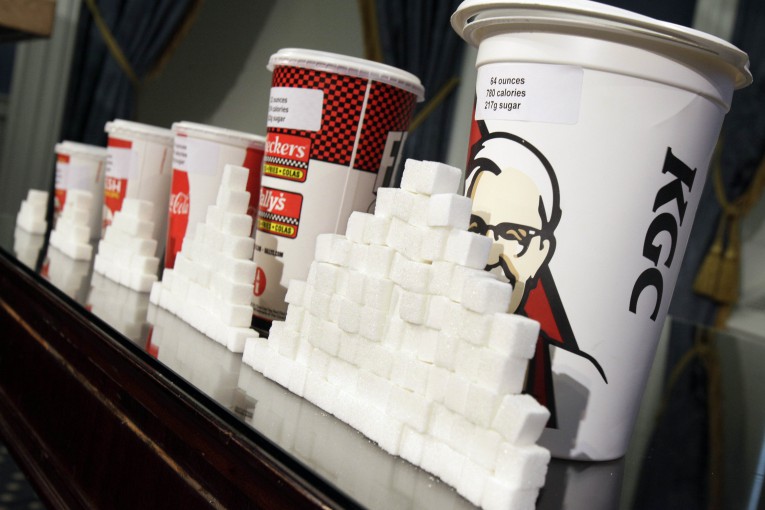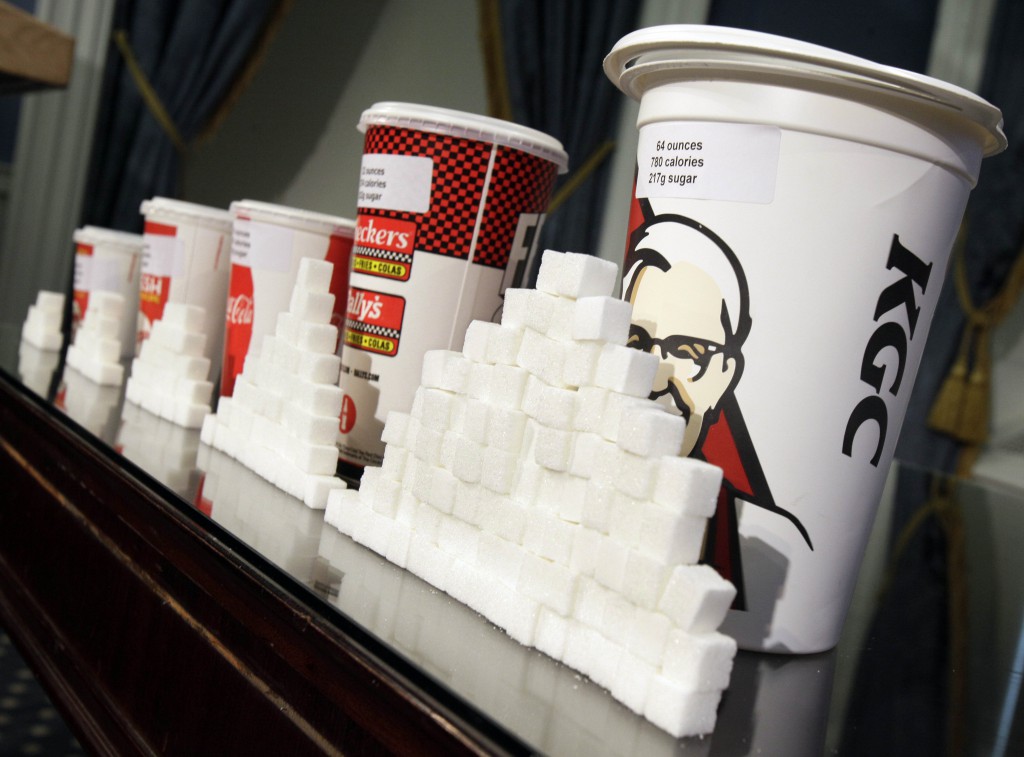
 As we debate whether to put a soda tax before the voters in Davis, there seems to be a lot of speculation without a lot of analytical ground for that speculation. One of the key questions is why Berkeley’s tax was able to pass at 76 percent while soda taxes in 30 other cities and states have failed. For one thing, because it was a general tax, it needed just a simple majority. That means the money cannot be specified for a specific purpose.
As we debate whether to put a soda tax before the voters in Davis, there seems to be a lot of speculation without a lot of analytical ground for that speculation. One of the key questions is why Berkeley’s tax was able to pass at 76 percent while soda taxes in 30 other cities and states have failed. For one thing, because it was a general tax, it needed just a simple majority. That means the money cannot be specified for a specific purpose.
However, it passed with enough support for a two-thirds threshold. San Francisco’s measure, on the other hand, actually received a majority of votes at 55 percent, but that was well short of the two-thirds needed because it specifically directed revenue to physical education and nutrition programs for kids.
The San Francisco Chronicle analyzed this issue in November of 2014. Corey Cook, a political science professor at the University of San Francisco, ran a precinct by precinct analysis of how residents voted and found, “If all of San Francisco voted along the lines of the Castro, Haight, Potrero Hill and, yes, Noe Valley, the soda tax would have won. But neighborhoods with more low-income and minority voters, including Chinatown, Bayview-Hunters Point and Visitacion Valley, voted against the tax.”
Ironically, those are the areas that most needed the revenue for the nutrition and other programs.
There is also the fact that the American Beverage Association poured a whopping $9.1 million into defeating the measure and they concentrated their spending in low-income, minority neighborhoods.
Berkeley is smaller, whiter and wealthier than San Francisco and probably behaved more like Noe Valley and like rest of the neighborhoods in San Francisco that voted for the tax, the San Francisco Chronicle speculates.
Georgetown University Professor Lawrence Gostin, who specializes in public health law and supports soda taxes, told the Chronicle that “the strategy is common because low-income people drink more soda and cannot easily afford the extra taxes. To win them over, soda tax proponents must work closely with churches, health advocates and community leaders in those neighborhoods.”
“We need to consult them, engage them and have the voice come from them,” he said. “They need to say, ‘We won’t stand for this for our children.’”
If that analysis holds, it bodes well for a similar measure passing in Davis.
A big question is whether the soda tax, which will target distribution, has any effect on soda retail prices. Given how recently the tax has been implemented, the findings are very mixed.
A huge team of researchers presented interim results November 3, 2015, at the American Public Health Association. They find that “the one cent per ounce tax has been fully passed on to the retail pricing of sugar sweetened beverages in large and small chain supermarkets and chain gas stations, a prerequisite for taxes to reduce consumption.”
Data from the City of Berkeley, they report, “also show that over $692,000 in revenues were raised in the first six months (or over a dollar for every resident per month), to be used in general fund efforts to promote healthier communities in the City.”
The preliminary results are based on data from two studies, one which collected prices from 26 stores pre-tax and again at four months, and the second, analyzing sales, weighed data on 9.1 million beverage transactions in two grocery chains during the first six months.
The researchers found, “Price changes varied by store and product type as well as by package size. Findings were consistent across studies and with a recently published smaller study.”
A similar 10 percent beverage tax in Mexico has been shown to decrease consumption of sugar-sweetened beverages.
Another team of researchers, looking just three months after the implementation of the tax, found a different result. “Higher Retail Prices of Sugar-Sweetened Beverages 3 Months After Implementation of an Excise Tax in Berkeley, California” by Jennifer Falbe, Nadia Rojas, and Kristine A. Madsen with the School of Public Health, University of California, Berkeley and Anna H. Grummon with the Gillings School of Global Public Health, University of North Carolina, Chapel Hill, published their account in the American Journal of Public Health.
They find, “Approximately 3 months after the tax was implemented, SSB retail prices increased more in Berkeley than in nearby cities, marking a step in the causal pathway between the tax and reduced SSB consumption.”
However, a third study, a working paper by economists John Cawley of Cornell University and David Frisvold of the University of Iowa for the National Bureau of Economic Research, that was published this August, attempted to “estimate the pass-through of the first city-level tax on SSBs in the U.S., which was enacted by the voters of Berkeley, California in November, 2014.”
They find, “Estimates from difference-in-differences and other models consistently indicate that there was relatively little pass through of the Berkeley SSB tax to consumers; across brands and sizes, we estimate that retail prices rose by less than half of the amount of the tax. This is in contrast to much of the previous literature on the pass-through of taxes, which tended to find full or even overshifting of taxes.”
What does all of this mean? For one thing, attempting to ascertain the impact of a tax less than a year after the voters pass it is probably not the most fruitful analysis.
However, the voter analysis in San Francisco suggests strategies for cities to combat the rhetoric of the beverage industry, and also provides some evidence that a soda tax may be successful in Davis.
—David M. Greenwald reporting






So what’s the rush to bring this tax to Davis before we know if it actually works?
Children who are diabetic or prediabetic
So you admit that we don’t know if it will have any real impact but we should be willing to experiment with our money in order to social engineer? Why not wait for solid evidence?
I don’t think we have a definitive word on whether it will work. There is evidence out of Mexico that has worked. How many kids will be consigned to a life of diabetes while we wait to have definitive proof? Also you’re looking at exactly one angle of the program – there is another – whether the money generated going into education programs can help. As Robb Davis has pointed out this is a multi-faceted approach and this one piece is not going to solve the problem, but I think it’s a piece in both a deterrent and funding mechanism.
We don’t know how many will get diabetes if we didn’t enact a soda tax because we have no proof that it actually does any good.
It’s OK BP, I don’t understand insanity either.
Thanks Alan, I know many who aren’t buying into this. Most of my neighbors are against it and reading comments in the Enterprise maybe there’s a chance Davis will come to its senses if this ever makes the ballot.
BP said . . . “So what’s the rush to bring this tax to Davis before we know if it actually works?”
From a revenue generation perspective, how can it not work? That has never been in question for me. The question I have is how the revenues will be spent, and how that spending will be accountably monitored.
completely agree matt – that is the key question.
Yeah, you tax anything and it will generate revenue. So let’s just leave it at that, the city needs money and let’s use the tax for roads and infrastructure and let’s stop the charade that somehow this tax will do much if anything for diabetes.
Perhaps, just perhaps, BP, it will both generate revenue and do something about the steep rise of the incidence of diabetes. Is that a bad outcome in your worldview?
Question to BP and all Vanguardians everywhere . . .
Rank in order of fairness the following tax alternatives
— Parcel Tax
— Utility Users Tax
— Transient Occupancy Tax
— Sweetened Beverage Tax
— Sales Tax
Once you have declared your order, take a moment and explain why you see the relative fairness that way.
Feel free to add other taxing alternatives that you believe the City has at its disposal.
BP
A question and a comment.
“Actually works in which capacity” ? I can think of several ways in which has a potential for “working”.
1. As a revenue raiser ?
2. As an incentive to decrease soda consumption ?
3. As education by raising the awareness of the issue by publicizing it ?
Now for the comment. As a doctor dealing on a daily basis with the health care problems related to obesity, diabetes, cardiovascular disease, renal disease, pregnancy complications and in the older population joint replacements, immobility issues including increased stroke risk, and as an advocate for public health for the past 11 years, I do not see this is as a “rush”. While the idea of the taxation of sodas may be new outside of the health community, it is certainly not a new concept within it. So while from your perspective it may seem like a “rush”, from my perspective it seems like a long, long time past due.
underrated comment by tia. wish we had a like feature here.
And for a more objective view on why I feel the way I do.
http://www.cdc.gov/diabetes/data/statistics/2014statisticsreport.html
BP
While your assertion that we do not know how many will get diabetes is we didn’t enact a soda tax is true as stands, it omits some important considerations.
First, we have a working model of how taxation, along with many other measure taken as a whole, did indeed having a strikingly beneficial outcome. That is the reduction in smoking in our country. Individuals and individual communities acting one by one were the mainstay of this effort. And every effort needs a starting place.
Which brings me to the second point. We never know for sure when something is initiated if it will “work”. Will people accept it ? Will it have the desired effects be they financial, personal health, public health ? We never know when we start. We would not have vaccination as an option if no one had been willing to act on the evidence and their own faith in order to demonstrate its effectiveness. Likewise with antibiotics. There would be no medical progress at all if some were not willing to take the steps necessary to demonstrate effectiveness.
So why not wait before we extract money from people to at least know if something works. Why must we be the lab rats for this experiment? We are one of many thousands of cities in this nation so why must we jump to the forefront without factual evidence that it will do any good? We already are going to need taxes for our roads and infrastructure, how can we even think of adding more taxes for something we have no idea if it will do much at all?
Because the evidence is overwhelming that if you do nothing, the problem will only get worse.
Your post is an example of the poor state of education in/understanding of science and logic, that seems as epidemic as type II diabetes.
Before we start taxing and spending shouldn’t we at least know what we’re doing is going to work? Doesn’t that sound logical?
you seem to be missing that there are two components to this – one is a revenue component which would bring money for programs. the other is a stick to discourage consumption. the consumption component is not yet proven – although there is certainly evidence that it has worked in mexico. the revenue component is not in question.
BP
Why not wait ?
Let’s start with my direct experience. Thirty years ago, I started my career as a General Medical Officer on the Tohono Ottam reservation outside of Tucson. I was shocked. Half of the population were overweight or obese. The visual effect alone was staggering. But as I have pointed out previously, this is not about physical appearance, but about the disastrous short and long term increased medical risks for the individual and the community. I found out within the first week of my experience there the consequences of uncontrolled blood sugar. I watched patients lose pregnancies or deliver prematurely. I watched people die from infections that their body could not successfully fight off due to uncontrolled blood sugars. I saw people lose their eyesight, go on dialysis, have heart attacks, and many, many amputations all because of an almost completely preventable disease epidemic in their community. After two years, I returned to Northern California and what I perceived to be the norm. Just as some posters here have stated, I no longer perceived this as a problem for my population. I was wrong.
What I have seen in the past 30 years is the general population trending more and more towards the model on the reservation. We now have, as I stated previously 1/2 of our pregnant patients meeting the overweight / obese criteria. In Davis the statistic at my last count was 1/3.
For the remainder of your questions that I consider medically relevant and thus with in my purview:
1. “To at least know that something works” – we have the model of decreasing cigarette usage to demonstrate efficacy of a combined approach in which taxation was one piece of the comprehensive approach. And, as previous stated, almost every major medical advance has initially been based on something that we were not sure “would work”.
2. “Why must we be lab rats?” – you do not seem to understand that we are already lab rats. We are a naturally occurring experiment demonstrating what happens when you allow an industry to freely market its goods regardless of their merit or harm to a large and vulnerable population ….. our children. The evidence of the outcome of this 30 + year experiment is all around you in the form of increasing rates of childhood obesity and diabetes. Perhaps you are unaware, but 30 years ago, Type II diabetes was a virtually unknown pediatric diagnosis. The incidence has been steadily rising to the point where now it is no longer even surprising. While it is true that this is not a contagious disease as in the form of a virus or bacteria, it is equally true that this is an epidemic and needs to be addressed now, not at some unspecified point in the future.
If you feel that you have better ideas to add, as when Frankly advocated labeling ( with which I agree), please do so. All of our attempts to date seem to be losing. I would love to hear your positive suggestions for how to deal with this epidemic.
Just a thought on the issue of when it would be timely to implement a soda tax: The provision could be implemented right away but include a sunset (expiration) date that would be sufficiently far out to permit an evaluation of its effectiveness. A determination could be made sometime prior to the sunset date as to whether the tax should be extended or made permanent.
How about instead of experimenting with something why not wait and see if it works first?
Do you give out untested drugs and determine later whether they were effective or not?
No. But the situations are not comparable. The potential adverse consequences of authorizing use of an untested drug are likely to be far more serious than the consequences of spending a few cents more for a can of Coke.
That is a bad comparison BP. There is no downside risk associated with a soda tax. The worst that it can do medically is have no effect. Drugs, by their very nature, create side effects, some of which are dangerous to the health, and even life, of the person taking the drug. Lots and lots of downside risk for drugs.
No risk vs Lots of risk. Two entirely different things.
Old article but it makes a good point. The federal government uses tax dollars to subsidizes corn farmers driving the cost of corn syrup down allowing the soda industry to sell their unhealthy products at ridiculously cheap prices. I’d like to see public health officials go after this policy.
Taxa-Cola- Why tax soda that we already subsidize
http://nymag.com/news/intelligencer/65373/
“In short: We pay federal taxes to make that can of Mountain Dew cheaper than it should be, encouraging us to buy it. Then we are scolded by public-health authorities for doing so. Then New York proposes another tax, to discourage us from buying it. This is nuts.”
On the plus side, this is one tax you can completely avoid paying.
My favorite kind of tax.